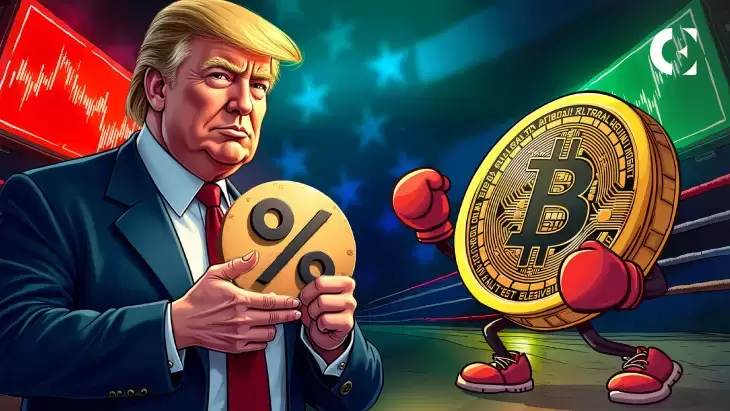 |
|
 |
|
 |
|
 |
|
 |
|
 |
|
 |
|
 |
|
 |
|
 |
|
 |
|
 |
|
 |
|
 |
|
 |
|
Cryptocurrency News Articles
Trump's "Liberation Day" Trade Policy Slams the Brakes on Bitcoin (BTC) and the Crypto Market
Apr 02, 2025 at 07:55 pm
The move, which aims to boost American manufacturing and reduce reliance on foreign goods, has sparked concerns about inflation, economic growth, and, notably, its impact on the cryptocurrency market.

President Donald Trump’s highly anticipated trade policy, "Liberation Day," has officially been unveiled, imposing a series of new tariffs on key U.S. trading partners. The move, which aims to boost American manufacturing and reduce reliance on foreign goods, has sparked concerns about inflation, economic growth, and, notably, its impact on the cryptocurrency market.
With Bitcoin (BTC) and other digital assets reacting sharply to the news, investors are now trying to assess whether this is a temporary setback or a sign of deeper market instability.
New Tariffs Announced
Trump’s policy, announced on Monday, includes a 25% tariff on imported goods from Canada and Mexico. These tariffs will also affect products from China, although at a lower rate of 10%. The administration claims that these measures will protect American jobs and manufacturing by discouraging reliance on foreign goods.
However, many economists warn that these tariffs could lead to higher consumer prices and increased production costs, ultimately putting pressure on inflation.
Historically, aggressive trade policies have led to economic uncertainties, affecting both traditional markets and alternative assets like cryptocurrencies.
Investors fear that if inflation rises and businesses pass the increased costs onto consumers, it could affect the Federal Reserve’s monetary policy decisions. If inflation surges, the Fed might be forced to raise interest rates again, which could have implications for high-risk assets such as Bitcoin and altcoins.
Crypto Market Reacts Quickly
The cryptocurrency market responded swiftly to Trump’s tariff announcement, with major digital assets experiencing sharp declines.
Bitcoin saw a significant drop, falling below the $100,000 mark and hitting lows of $92,000 within hours. Ethereum (ETH) also plummeted, losing 24% of its value and dropping to around $2,300.
This sudden volatility led to over $2 billion in liquidations in the crypto derivatives market, as over-leveraged traders were wiped out by the turbulence.
The sell-off highlights crypto’s sensitivity to macroeconomic shifts. While many investors view digital assets as a hedge against inflation and economic uncertainty, in the short term, sudden policy changes can lead to panic selling.
The question now is whether Bitcoin and other cryptocurrencies can recover quickly or if continued economic instability will suppress a rebound.
Tariffs Could Ultimately Benefit Bitcoin
While the immediate market reaction has been negative, some analysts suggest that these tariffs could ultimately benefit Bitcoin and other cryptocurrencies in the long run.
If trade tensions weaken the U.S. dollar, it could drive more investors toward decentralized assets like Bitcoin as an alternative store of value.
“If the dollar slides further, we might see more opportunistic traders deploying capital into less correlated assets, and that's where Bitcoin comes into play as a hedge against fiat currency depreciation and inflation in the short term,” said Jeff Park, head of alpha strategies at Bitwise Asset Management.
He further added that economic instability strengthens Bitcoin’s narrative as “digital gold.”
“The ongoing trade tensions are pushing up consumer prices, which could spill over into the crypto market as traders factor in the Federal Reserve's potential response to inflation with interest rate hikes,” Park explained.
This analysis suggests that as the dollar weakens and inflation worries mount, investors may seek to hedge their wealth in BTC, potentially fueling a new wave of adoption and price appreciation.
What’s Next For Crypto Investors?
For investors, the current downturn presents both risks and opportunities.
While short-term volatility is likely, those with a long-term perspective may see this as a chance to accumulate assets at a discount. However, continued uncertainty in global trade policies means market fluctuations may persist.
As the situation develops, all eyes will be on how traditional markets and policymakers respond to the effects of Trump’s tariffs. Whether this marks a temporary dip or the start of a prolonged correction remains to be seen.
Disclaimer:info@kdj.com
The information provided is not trading advice. kdj.com does not assume any responsibility for any investments made based on the information provided in this article. Cryptocurrencies are highly volatile and it is highly recommended that you invest with caution after thorough research!
If you believe that the content used on this website infringes your copyright, please contact us immediately (info@kdj.com) and we will delete it promptly.


























































